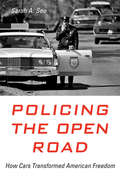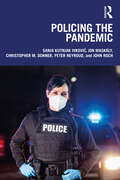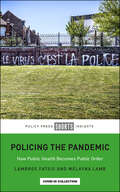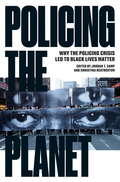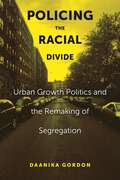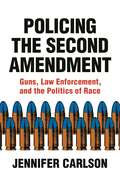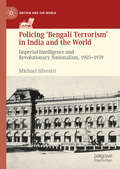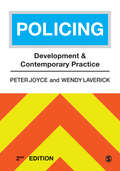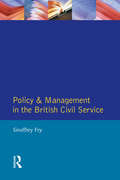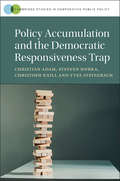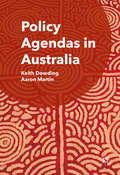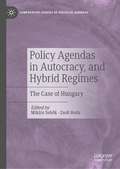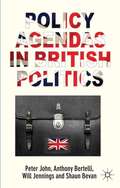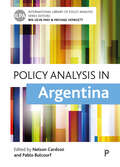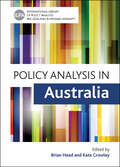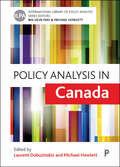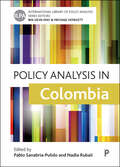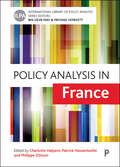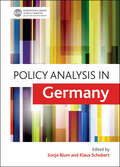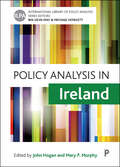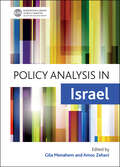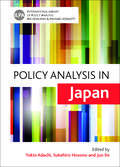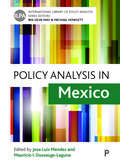- Table View
- List View
Policing the Open Road: How Cars Transformed American Freedom
by Sarah A. SeoSarah Seo shows that the rise of the car, the symbol of American personal freedom, led to ever more intrusive policing, with devastating consequences for racial equality in our criminal justice system. Criminal procedures designed to safeguard us on the road undermined the nation’s commitment to equal protection before the law.
Policing the Pandemic
by Peter Neyroud Sanja Kutnjak Ivković Jon Maskály Christopher M. Donner John RochPolicing the Pandemic explores how police agencies in United Kingdom and the United States have adjusted to their changing environments, both during the peak of the COVID-19 pandemic and later, when the restrictions have been relaxed and the societies have begun to develop their new normal.Combining interviews and surveys of police officers and police administrators from the United Kingdom and the United States, this book provides a systematic and empirically based account of these changes and elaborates on the lessons for the future. The book offers insight into organizational and operational changes brought on by the pandemic, including the changes in their workload, enforcement activities, and administrative changes. It examines police perceptions of, and compliance with, pandemic-related changes, any potential COVID-19-related training, and the frequency with which they used various responses when observing violations of COVID-19 regulations and laws. It also focuses on police officers’ own fear of contracting COVID-19, whether they had been diagnosed with COVID-19, and how the pandemic affected their own health, stress, and general well-being.This book is an essential reading for scholars, policymakers, and police administrators tackling issues such as procedural justice, organizational change, and police officer well-being, as well as those more widely engaged with societal and legal consequences of the pandemic, be it the COVID-19 pandemic or any future pandemics.
Policing the Pandemic: How Public Health Becomes Public Order
by Lambros Fatsis Melayna LambThe COVID-19 pandemic has highlighted the inadequacies of the state’s response to public health and public order issues through deeply flawed legislation. Written in the context of the #BlackLivesMatter protests, this book explores why law enforcement responses to a public health emergency are prioritised over welfare provision and what this tells us about the state’s criminal justice institutions. Informing scholarly, civic and activist thinking on the political nature of policing, it reveals how increasing police powers disproportionately affects Black people and suggests alternative ways of designing public safety beyond a law enforcement context.
Policing the Planet: Why the Policing Crisis Led to Black Lives Matter
by Jordan T. Camp Christina HeathertonHow policing became the major political issue of our timeCombining firsthand accounts from activists with the research of scholars and reflections from artists, Policing the Planet traces the global spread of the broken-windows policing strategy, first established in New York City under Police Commissioner William Bratton. It's a doctrine that has vastly broadened police power the world over--to deadly effect.With contributions from #BlackLivesMatter cofounder Patrisse Cullors, Ferguson activist and Law Professor Justin Hansford, Director of New York-based Communities United for Police Reform Joo-Hyun Kang, poet Martín Espada, and journalist Anjali Kamat, as well as articles from leading scholars Ruth Wilson Gilmore, Robin D. G. Kelley, Naomi Murakawa, Vijay Prashad, and more, Policing the Planet describes ongoing struggles from New York to Baltimore to Los Angeles, London, San Juan, San Salvador, and beyond.From the Trade Paperback edition.
Policing the Racial Divide: Urban Growth Politics and the Remaking of Segregation
by Daanika Gordon2023 Edwin H. Sutherland Book Award WinnerA behind-the-scenes account of the harsh realities of policing in a segregated city For thirteen months, Daanika Gordon shadowed police officers in two districts in “River City,” a profoundly segregated rust belt metropolis. She found that officers in predominantly whiteneighborhoods provided responsive service and engaged in community problem-solving, while officers in predominantly Black communities reproduced long-standing patterns of over-policing and under-protection. Such differences have marked US policing throughout its history, but policies that were supposed to alleviate racial tensions in River City actually widened the racial divides. Policing the Racial Divide tells story of how race, despite the best intentions, often dominates the way policing unfolds in cities across America.Drawing on in-depth interviews and hundreds of hours of ethnographic observation, Gordon offers a behind-the-scenes account of how the police are reconfiguring segregated landscapes. She illuminates an underexplored source of racially disparate policing: the role of law enforcement in urban growth politics. Many postindustrial cities are increasing the divisions of segregation, Gordon argues, by investing in downtowns, gentrified neighborhoods, and entertainment corridors, while framing marginalized central city neighborhoods as sources of criminal and civic threat that must be contained and controlled. Gordon paints a sobering picture of modern-day segregation, and how the police enforce its racial borders, showing us two separate, unequal sides of the same city: one where rich, white neighborhoods are protected, and another where poor, Black neighborhoods are punished.
Policing the Second Amendment: Guns, Law Enforcement, and the Politics of Race
by Jennifer CarlsonAn urgent look at the relationship between guns, the police, and raceThe United States is steeped in guns, gun violence—and gun debates. As arguments rage on, one issue has largely been overlooked—Americans who support gun control turn to the police as enforcers of their preferred policies, but the police themselves disproportionately support gun rights over gun control. Yet who do the police believe should get gun access? When do they pursue aggressive enforcement of gun laws? And what part does race play in all of this? Policing the Second Amendment unravels the complex relationship between the police, gun violence, and race. Rethinking the terms of the gun debate, Jennifer Carlson shows how the politics of guns cannot be understood—or changed—without considering how the racial politics of crime affect police attitudes about guns.Drawing on local and national newspapers, interviews with close to eighty police chiefs, and a rare look at gun licensing processes, Carlson explores the ways police talk about guns, and how firearms are regulated in different parts of the country. Examining how organizations such as the National Rifle Association have influenced police perspectives, she describes a troubling paradox of guns today—while color-blind laws grant civilians unprecedented rights to own, carry, and use guns, people of color face an all-too-visible system of gun criminalization. This racialized framework—undergirding who is “a good guy with a gun” versus “a bad guy with a gun”—informs and justifies how police understand and pursue public safety.Policing the Second Amendment demonstrates that the terrain of gun politics must be reevaluated if there is to be any hope of mitigating further tragedies.
Policing ‘Bengali Terrorism’ in India and the World: Imperial Intelligence and Revolutionary Nationalism, 1905-1939 (Britain and the World)
by Michael SilvestriThis book examines the development of imperial intelligence and policing directed against revolutionaries in the Indian province of Bengal from the first decade of the twentieth century through the beginning of the Second World War. Colonial anxieties about the 'Bengali terrorist' led to the growth of an extensive intelligence apparatus within Bengal. This intelligence expertise was in turn applied globally both to the policing of Bengali revolutionaries outside India and to other anticolonial movements which threatened the empire. The analytic framework of this study thus encompasses local events in one province of British India and the global experiences of both revolutionaries and intelligence agents. The focus is not only on the British intelligence officers who orchestrated the campaign against the revolutionaries, but also on their interactions with the Indian officers and informants who played a vital role in colonial intelligence work, as well as the perspectives of revolutionaries and their allies, ranging from elite anticolonial activists to subaltern maritime workers.
Policing: Development and Contemporary Practice
by Peter Joyce Wendy LaverickA comprehensive introduction to policing in England and Wales, providing you with an in-depth understanding of the challenges and complexities of modern policing and an increased awareness of the history and development of the profession. This second edition covers the most pressing debates and issues associated with contemporary policing and examines a range of key topics such as methods of policing, diversity and the police, police accountability, and much more. The new edition includes: A new chapter on women in policing Expanded content on diversity issues within the police service An account of the changes to transnational policing as a result of Brexit Reflections on the use of social media by police Advice for those wanting to embark on a career in the field. Written in an introductory way that is ideal for any policing, criminology, or criminal justice student new to police studies.
Policing: Development and Contemporary Practice
by Peter Joyce Wendy LaverickA comprehensive introduction to policing in England and Wales, providing you with an in-depth understanding of the challenges and complexities of modern policing and an increased awareness of the history and development of the profession. This second edition covers the most pressing debates and issues associated with contemporary policing and examines a range of key topics such as methods of policing, diversity and the police, police accountability, and much more. The new edition includes: A new chapter on women in policing Expanded content on diversity issues within the police service An account of the changes to transnational policing as a result of Brexit Reflections on the use of social media by police Advice for those wanting to embark on a career in the field. Written in an introductory way that is ideal for any policing, criminology, or criminal justice student new to police studies.
Policy & Management British Civil Servic
by Geoffrey K. FryA detailed study of the changes which have taken place in the British Civil Service since 1979. It is intended for political and policy scientists, and sociologists.
Policy Accumulation and the Democratic Responsiveness Trap (Cambridge Studies in Comparative Public Policy)
by Christoph Knill Christian Adam Steffen Hurka Yves SteinebachThe responsiveness to societal demands is both the key virtue and the key problem of modern democracies. On the one hand, responsiveness is a central cornerstone of democratic legitimacy. On the other hand, responsiveness inevitably entails policy accumulation. While policy accumulation often positively reflects modernisation and human progress, it also undermines democratic government in three main ways. First, policy accumulation renders policy content increasingly complex, which crowds out policy substance from public debates and leads to an increasingly unhealthy discursive prioritisation of politics over policy. Secondly, policy accumulation comes with aggravating implementation deficits, as it produces administrative backlogs and incentivises selective implementation. Finally, policy accumulation undermines the pursuit of evidence-based public policy, because it threatens our ability to evaluate the increasingly complex interactions within growing policy mixes. The authors argue that the stability of democratic systems will crucially depend on their ability to make policy accumulation more sustainable.
Policy Agendas in Australia
by Keith Dowding Aaron MartinThis book contributes to and expands on the major international Comparative Policy Agendas Project. It sets the project in context, and provides a comprehensive assessment of the changing policy agenda in Australia over a forty-year period, using a unique systematic dataset of governor-general speeches, legislation and parliamentary questions, and then mapping these on to media coverage and what the public believes (according to poll evidence) government should be concentrating upon. The book answers some important questions in political science: what are the most important legislative priorities for government over time? Does the government follow talk with action? Does government attend to the issues the public identifies as most important? And how does media attention follow the policy agenda? The authors deploy their unique dataset to provide a new and exciting perspective on the nature of Australian public policy and the Comparative Policy Agendas Project more broadly.
Policy Agendas in Autocracy, and Hybrid Regimes: The Case of Hungary (Comparative Studies of Political Agendas)
by Zsolt Boda Miklós SebőkOver the past thirty years the comparative study of policy agendas under the aegis of the Comparative Agendas Project (CAP) has become one of the fastest growing sub-field in policy research. Yet, similarly to policy studies in general, most of the agenda-setting literature focuses on well-established democracies. This edited volume offers a ground-breaking analysis of a hitherto less examined topic in comparative politics: the dynamics of policy agendas in Socialist autocracy and in hybrid regimes. We propose that policymaking in authoritarian and illiberal regimes is different from the practices of democracies which we analyse based on a unique historical policy agendas database built by the Hungarian CAP team at the Centre for Social Sciences in Budapest. We find that punctuated equilibrium theory offers a good description of policy dynamics regardless of policy regimes, yet punctuations are more pronounced in autocratic and illiberal settings. These regime types also share a tendency towards centralization, a less efficient use of public information and a suppression of democratic participation in the policy process. This book may be of interest to scholars and students of policy studies, agenda-setting and the politics of authoritarianism.
Policy Agendas in British Politics
by Peter John Anthony Bertelli Will Jennings Shaun BevanUsing a unique dataset spanning fifty years of policy-making in Britain, this book traces how topics like the economy, international affairs, and crime have shifted in importance. It takes a new approach to agenda setting called focused adaptatio n, and sheds new light on key points of change in British politics, such as Thatcherism and New Labour.
Policy Analysis in Argentina
by Nelson Cardozo and Pablo BulcourfInternational Library of Policy Analysis, Vol 20The latest edition in the International Library of Policy Analysis series explores a comprehensive overview of policy analysis in Argentina. It explores theoretical frameworks, views of the State, the development of the field, and current paradigms before examining knowledge produced at different levels (federal, provincial, and local); the application of the discipline by 'Internal Policy Advisory Councils, Consultants, and Committees'; the role of think tanks, NGOs, and political parties; and the developments provided by university teaching and research. Analysing the conceptual frameworks and methodologies used from a meta-theoretical perspective, it provides a panoramic picture of the perspectives and challenges of policy analysis in Argentina.
Policy Analysis in Australia (International Library of Policy Analysis)
by Brian Head and Kate CrowleyPolicy Analysis in Australia offers a distinctly Australian interpretation of policy scholarship with eighteen chapters strongly reflecting the outstanding contributions of Australian scholars to the field of public policy. It provides a coherent overview of the strengths and opportunities for policy analysis in Australia. It recognises that government agencies are no longer regarded as the sole source of sound policy analysis, and takes a broad view of policy analysis capacity, both within institutions at all levels of government, and beyond government in the media, political parties, business, and non-government associations. It provides a valuable contribution to Australian scholarship about policy analysis in academic, professional, teaching and learning contexts, and is a key addition to research and teaching in comparative policy analysis and policy studies more generally.
Policy Analysis in Canada
by Laurent Dobuzinskis Michael Howlett David LaycockThe growth of what some academics refer to as 'the policy analysis movement' represents an effort to reform certain aspects of government behaviour. The policy analysis movement is the result of efforts made by actors inside and outside formal political decision-making processes to improve policy outcomes by applying systematic evaluative rationality to the development and implementation of policy options. This volume offers a comprehensive overview of the many ways in which the policy analysis movement has been conducted, and to what effect, in Canadian governments and, for the first time, in business associations, labour unions, universities, and other non-governmental organizations.Editors Laurent Dobuzinskis, Michael Howlett, and David Laycock have brought together a wide range of contributors to address questions such as: What do policy analysts do? What techniques and approaches do they use? What is their influence on policy-making in Canada? Is there a policy analysis deficit? What norms and values guide the work done by policy analysts working in different institutional settings? Contributors focus on the sociology of policy analysis, demonstrating how analysts working in different organizations tend to have different interests and to utilize different techniques. They compare and analyze the significance of these different styles and approaches, and speculate about their impact on the policy process.
Policy Analysis in Canada (International Library of Policy Analysis ,13)
by Laurent Dobuzinskis and Michael HowlettPolicy analysis in Canada brings together original contributions from many of the field’s leading scholars. Contributors chronicle the evolution of policy analysis in Canada over the past 50 years and reflect on its application in both governmental and non-governmental settings. As part of the International Library of Policy Analysis series, the book enables cross-national comparison of public policy analysis concepts and practice within national and sub-national governments, media, NGOs and other institutional settings. Informed by the latest scholarship on policy analysis, the volume is a valuable resource for academics and students of policy studies, public management, political science and comparative policy studies.
Policy Analysis in Colombia (International Library of Policy Analysis)
by Pablo Sanabria-Pulido and Nadia RubaiiLeading Colombian academics and experienced policy practitioners cast new light on their country in this systematic overview of policy analysis for an international audience. Examining the historical development and current status of policy analysis as a field of study and in practice, it considers public policy analysis in government and the judiciary, and across domains including health, education and the military. Contributors also delve into Colombia’s notable success in economic regeneration, the management of cultural diversity and the resolution of long-term internal armed conflict. Not just an important summation of policy analysis in Colombia, this book also provides insights and lessons applicable elsewhere.
Policy Analysis in France (International Library of Policy Analysis)
by Charlotte Halpern, Patrick Hassenteufel and Philippe ZittounPolicy analysis in France lays the foundation for a more systematic understanding of policy analysis in the country. In doing so, the volume discusses the role of the State and its restructuring, processes of government and governance, and State-Society relationships and policies as both a process and an outcome. Through 18 chapters contributions focus on policymakers, their practices, ideas and discourses, how they engage in sustained relationships with a large variety of market and society actors, and the concrete devices they use in order to make policy objectives operational. This is a comprehensive study of policy analysis in France that will be valuable to academics and postgraduate students researching and studying a range of policy and public management areas.
Policy Analysis in Germany (International Library of Policy Analysis)
by Sonja Blum and Klaus SchubertThis comprehensive study, part of the International Library of Policy Analysis, brings together for the first time a systemic overview of policy analysis activities in Germany. Written by leading experts in the field – including informed practitioners – it outlines the development of the discipline, identifies its role in academic education and research, and examines its styles and methods. The book also focuses on the role of policy analysis for governments and parliaments, for parties, social partners, and interest groups. By offering a rich and timely analysis of policy analysis in Germany, this book is a valuable resource for academic exchange and for teaching, particularly in the fields of political science, social sciences, economics and geography. Moreover, by its broad, comprehensive understanding of ‘policy analysis’, the book will be of practical relevance and shape the debate for the future development of policy analysis in Germany and the different spheres where it is practised.
Policy Analysis in Ireland (International Library of Policy Analysis)
by John Hogan and Mary P. MurphyLeading Irish academics and policy practitioners present a current and comprehensive study of policy analysis in Ireland. Contributors examine policy analysis at different levels of government and governance including international, national and local and in the civil service, as well as non-government actors such as NGOs, interest groups and think tanks. They investigate the influential roles of the European Union, the public, science, quantitative evidence, the media and gender expertise in policy analysis. Surveying the history and evolution of public policy analysis in Ireland, this authoritative text addresses the current state of the discipline, identifies post-crisis developments and considers future challenges for policy analysis.
Policy Analysis in Israel (International Library of Policy Analysis ,7)
by Gila Menahem and Amos ZehaviIsrael is considered a developed country yet both security issues and its frequently changing demographic makeup set Israel apart and imply that Israeli policy analysts must operate in a unique environment and grapple with exceptional challenges. This volume, part of the successful International Library of Policy Analysis series, brings together for the first time a comprehensive study of policy analysis in Israel. Following an introductory chapter that discusses the paradoxical history of policy analysis in Israel by Yehezkel Dror, leading figures from both the Israeli public and academic spheres discuss different aspects of policy analysis in Israel. While Israeli policy analysis is in some respects unique, Israel also represents a broad category of states that could be considered as policy analysis "late developers". Hence, while Israeli policy analysis is fascinating in and of itself, its study also holds important lessons for other countries.
Policy Analysis in Japan (International Library of Policy Analysis ,4)
by Yukio Adachi, Sukehiro Hosono and Jun IioWhile studies of policy analysis in other countries have assessed their needs and integrated them into training programmes for professional policy analysts, Japanese studies have been very limited. Policy analysis in Japan brings together for the first time a detailed examination of the theory and practice of policy analysis systems in Japan, at different levels. As part of the successful International Library of Policy Analysis series edited by Iris Geva-May and Michael Howlett, the book provides expert analysis to closely examine to what extent the Japanese government has succeeded in providing key policy actors with evidence-informed policy options, thereby improving the likelihood of better policies being adopted and implemented. The book also assesses Japan’s future policy directions, allowing policy researchers and practitioners to draw a number of lessons from the Japanese experience. The book includes empirical case studies to aid teaching and further research, and will be a valuable resource for students and academics as well as policymakers. Features of the ILPA series include: • a country-specific systematic study of policy analysis systems by government and non-governmental actors • a history of the country’s policy analysis, empirical case studies and a comparative overview of alternative approaches • a key reference collection for research and teaching in comparative policy analysis and policy studies
Policy Analysis in Mexico (International Library of Policy Analysis ,9)
by Jose-Luis Mendez and Mauricio I. Dussauge-LagunaPart of the International Library of Policy Analysis series, this book provides the first detailed examination of the practice of policy analysis in Mexico. Whilst shaped by the legacy of the Mexican state’s colonial history as well as by recent social, economic and political developments, the study of policy analysis within Mexico provides important comparative lessons for other countries. Contributors study the nature of policy analysis at different sectors and levels of government as well as by non-governmental actors, such as unions, business, NGOs and the media, promoting the use of evidence-based policy analysis, leading to better policy results. The book is a vital resource for academics and students of policy studies, public management, political science and comparative policy studies.
